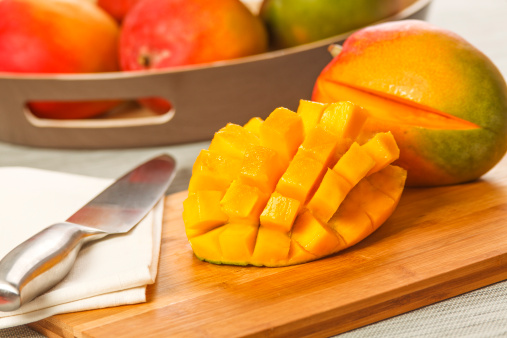 Did you know that approximately one out of every three Americans has pre-diabetes, but nine of 10 don’t even know they have it?
Did you know that approximately one out of every three Americans has pre-diabetes, but nine of 10 don’t even know they have it?
Pre-diabetes occurs when your blood sugar levels are higher than normal. Levels aren’t high enough to be considered diabetic, but up to 30% of people who have pre-diabetes can develop type 2 diabetes within five years!
Furthermore, chronic high blood sugar levels can lead to a whole host of complications, including stroke, damage to the kidneys, nerve damage, cardiovascular disease, skin problems, gum infections, and blindness.
The good news is that there are certain foods that can help you lose weight and lower your blood sugar to acceptable levels.
10 Foods to Help Lower Your Blood Sugar Levels
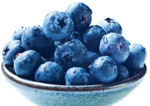 1. Blueberries: People who are insulin-resistant develop diabetes because the insulin their bodies produce is not absorbed and used effectively. In a 2010 study published in the Journal of Nutrition, researchers discovered that daily consumption of blueberries can increase the body’s sensitivity to insulin. When the body consumes too many carbohydrates, too much insulin is produced, which can lead to insulin resistance. Aside from lowering blood sugar levels, the antioxidants found in blueberries can fight damage done by free radicals and reduce accelerated aging.
1. Blueberries: People who are insulin-resistant develop diabetes because the insulin their bodies produce is not absorbed and used effectively. In a 2010 study published in the Journal of Nutrition, researchers discovered that daily consumption of blueberries can increase the body’s sensitivity to insulin. When the body consumes too many carbohydrates, too much insulin is produced, which can lead to insulin resistance. Aside from lowering blood sugar levels, the antioxidants found in blueberries can fight damage done by free radicals and reduce accelerated aging. 2. Mangos: According to a recent study published in the journal Nutrition and Metabolic Insights, researchers discovered that a consumption of 10 grams of freeze-dried mangos can lower the blood sugar level in those who are obese or overweight. Mangos also contain over 20 different types of vitamins and minerals.
2. Mangos: According to a recent study published in the journal Nutrition and Metabolic Insights, researchers discovered that a consumption of 10 grams of freeze-dried mangos can lower the blood sugar level in those who are obese or overweight. Mangos also contain over 20 different types of vitamins and minerals.
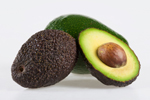 3. Avocados: Avocados are high in monounsaturated fats, which are essential in slowing down the release of sugars into the body’s bloodstream. Bonus: This fruit can be very beneficial for those who are avid exercisers, because it contains beta-sitosterol, which can help reduce inflammation after a vigorous workout.
3. Avocados: Avocados are high in monounsaturated fats, which are essential in slowing down the release of sugars into the body’s bloodstream. Bonus: This fruit can be very beneficial for those who are avid exercisers, because it contains beta-sitosterol, which can help reduce inflammation after a vigorous workout.
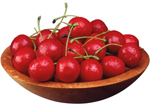 4. Cherries: Cherries contain anthocyanins, which can lower a person’s blood sugar levels. In a recent study that was published in the Journal of Agricultural and Food Chemistry, researchers discovered that anthocyanins can reduce insulin production by almost 50%.
4. Cherries: Cherries contain anthocyanins, which can lower a person’s blood sugar levels. In a recent study that was published in the Journal of Agricultural and Food Chemistry, researchers discovered that anthocyanins can reduce insulin production by almost 50%.
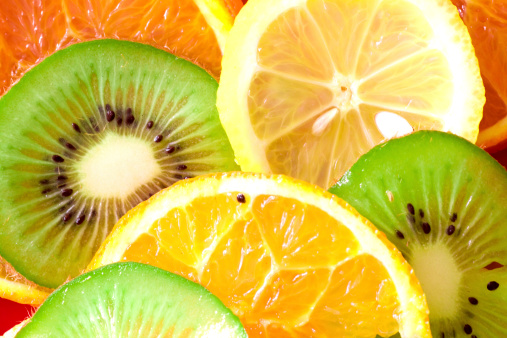 5. Oranges: Oranges contain pectin, a rich type of fiber that has been known to lower cholesterol levels. It also contains a low glycemic index (GI), which means that the glucose levels are not greatly affected. The American Diabetes Association states that foods that have a low GI generally do not affect the body’s blood sugar and insulin levels. Oranges are also antioxidant-rich and filled with vitamin C, which may also help prevent cell damage.
5. Oranges: Oranges contain pectin, a rich type of fiber that has been known to lower cholesterol levels. It also contains a low glycemic index (GI), which means that the glucose levels are not greatly affected. The American Diabetes Association states that foods that have a low GI generally do not affect the body’s blood sugar and insulin levels. Oranges are also antioxidant-rich and filled with vitamin C, which may also help prevent cell damage.
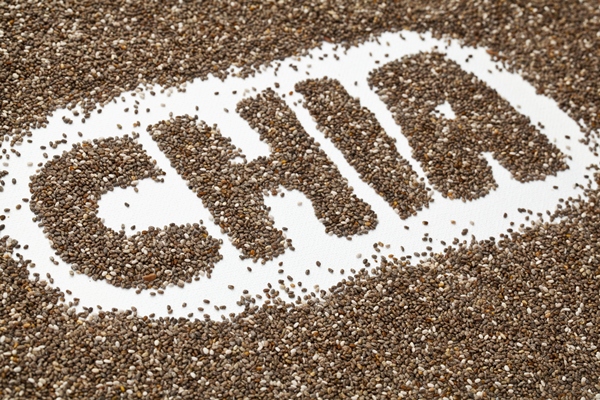 6. Chia seeds: Chia seeds are gluten-free and loaded with antioxidants, protein, and fiber. Studies conducted on rats have shown that consuming chia seeds can lower triglycerides, improve insulin resistance, and stabilize blood sugar. Chia seeds are also high in fiber, potassium, magnesium, iron, and calcium, making this food a powerful anti-inflammatory agent.
6. Chia seeds: Chia seeds are gluten-free and loaded with antioxidants, protein, and fiber. Studies conducted on rats have shown that consuming chia seeds can lower triglycerides, improve insulin resistance, and stabilize blood sugar. Chia seeds are also high in fiber, potassium, magnesium, iron, and calcium, making this food a powerful anti-inflammatory agent.
 7. Cinnamon: In a 2003 study published in the journal Diabetes Care, researchers discovered that cinnamon could potentially cause the muscle and liver cells to respond more rapidly to insulin, which benefits those who are attempting to lose weight. The more your body responds to insulin, the better your blood sugar levels will be. Take half a teaspoon each day to help your body respond to insulin.
7. Cinnamon: In a 2003 study published in the journal Diabetes Care, researchers discovered that cinnamon could potentially cause the muscle and liver cells to respond more rapidly to insulin, which benefits those who are attempting to lose weight. The more your body responds to insulin, the better your blood sugar levels will be. Take half a teaspoon each day to help your body respond to insulin.
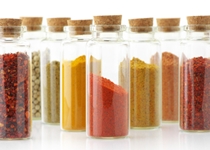 8. Spices: A 2005 animal study published in the Journal of Medicinal Food discovered that spices improved blood sugar and cholesterol levels. If both levels are at bay, your blood sugar and insulin levels can be lowered. Two beneficial spices to try are turmeric and fenugreek—both are known to help lower blood sugar levels and increase glucose metabolism.
8. Spices: A 2005 animal study published in the Journal of Medicinal Food discovered that spices improved blood sugar and cholesterol levels. If both levels are at bay, your blood sugar and insulin levels can be lowered. Two beneficial spices to try are turmeric and fenugreek—both are known to help lower blood sugar levels and increase glucose metabolism.
 9. Eggs: According to a 2011 study published in the medical journal The Lancet, eating eggs for breakfast can help maintain blood sugar and insulin levels for the rest of the day.
9. Eggs: According to a 2011 study published in the medical journal The Lancet, eating eggs for breakfast can help maintain blood sugar and insulin levels for the rest of the day.
Furthermore, a 2008 study published in the International Journal of Obesity revealed that those who ate two eggs a day for breakfast actually lost 65% more weight than those who didn’t.
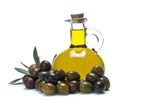 10. Extra virgin olive oil: Extra virgin olive oil is rich in oleic acid and polyphenols, which are effective in lowering blood glucose levels.
10. Extra virgin olive oil: Extra virgin olive oil is rich in oleic acid and polyphenols, which are effective in lowering blood glucose levels.
It is important to speak with your doctor to work out a personalized nutrition plan to help improve your blood sugar levels.
Sources:
“10 Blood Sugar-Lowering Foods,” Rodale News web site; http://www.rodalenews.com/how-lower-blood-sugar, last accessed June 9, 2015.
Dallas, M. E., “10 Foods That Can Help With Blood Sugar Control,” Everyday Health web site, November 5, 2014; http://www.everydayhealth.com/hs/managing-type-2-diabetes-every-day/foods-blood-sugar-control-pictures/#01.
“Diabetes Latest,” Centers for Disease Control and Prevention web site; http://www.cdc.gov/features/diabetesfactsheet/, last accessed June 9, 2015.
